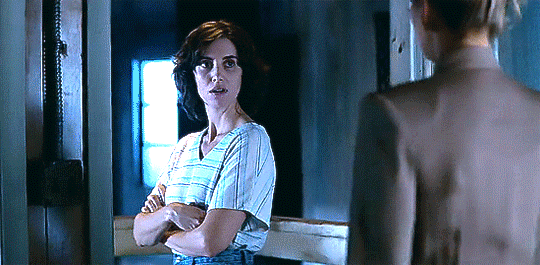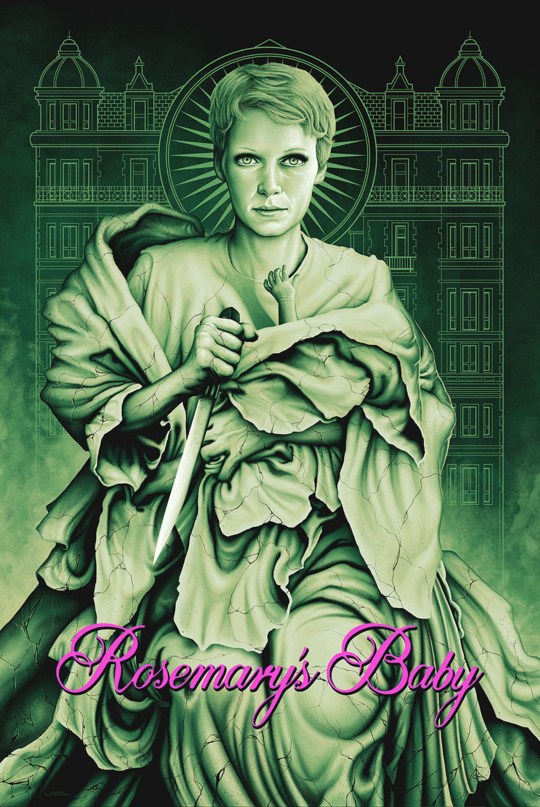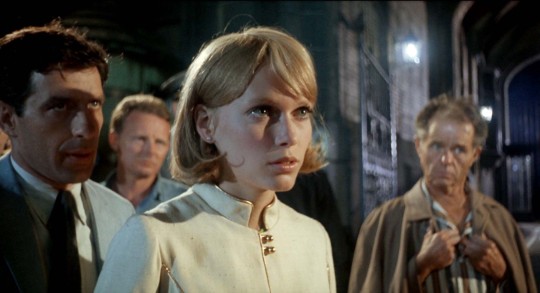#Ruth Levin
Explore tagged Tumblr posts
Text

Ruth Gordon in "Rosemary's Baby" (1968)
18 notes
·
View notes
Text






The holy trinity of ladies with the Eve Harrington syndrome: "Do I want to be her or on her?"
#crazyexedit#kcfhedit#glowedit#ruth x debbie#femslash#rebecca x valencia#rebecca audra#glow#netflix glow#crazy ex girlfriend#kevin can fuck himself#kevin can f**k himself#rebecca bunch#valencia perez#patty o'connor#allison mcroberts#debbie eagan#ruth wilder#audra levine#allison x jenn#tammy ridgeway#allison x tammy#I suppose#sine's gifs#q
276 notes
·
View notes
Text




Roman Polanski and Mia Farrow on set of Rosemary's Baby (1968)
#rosemary's baby#1968#roman polanski#ira levin#mia farrow#john cassavetes#ruth gordon#sidney blackmer#ralph bellamy
7 notes
·
View notes
Text

Steven Luros Holliday debuted a Rosemary's Baby poster at HorrorHound Weekend and has made the remaining quantity available online. Priced at $25, the 20x30 print is limited to 175.
#rosemary's baby#rosemarys baby#roman polanski#mia farrow#horror#steven luros holliday#art#gift#60s horror#1960s horror#john cassavetes#ira levin#ruth gordon#sidney blackmer#maurice evans
67 notes
·
View notes
Text
youtube
Seria "O bebê de Rosemary" um filme amaldiçoado?
#rosemary baby#william castle#roman polanski#mia farrow#satanism#devil baby#sharon tate#john cassavetes#1969#ira levin#Krzysztof Komeda#Ruth Gordon#Sidney Blackmer#Victoria Vetri#Charles Grodin#Youtube
2 notes
·
View notes
Text
Now watching:

#rosemary’s baby#ira levin#mia farrow#john cassavetes#ruth gordon#I am not going to name the rapist director
2 notes
·
View notes
Text
ROSEMARY'S BABY (1968) Reviews and 4K UHD release news
Rosemary’s Baby is being released on 4K Ultra HD on October 10, 2023, to celebrate the 55th anniversary of the horror classic. The new 4K Ultra HD package includes a Blu-ray as well as a Digital version and comes packaged in newly commissioned artwork. Meanwhile, here’s our previous coverage of the movie from way back in 2012. Rosemary’s Baby is a 1968 American horror film written and directed…

View On WordPress
#1968#film#horror#Ira Levin#John Cassavetes#Mia Farrow#movie#review#reviews#Roman Polanski#Rosemary&039;s Baby#Ruth Gordon#Sidney Blackmer
2 notes
·
View notes
Text
One of the great modern horror flicks.


Rosemary's Baby, 1968, dir. Roman Polanski
283 notes
·
View notes
Text
Apartment 7A (2024): No Need to Look at This Baby
Looking at the 2024 prequel Apartment 7A, one cannot help but feel that there was no need to look at this “prelude” baby. Author Ira Levin wrote Rosemary’s Baby, it was published in 1967. Roman Polanski snapped the book up and made the now iconic film in 1968. This attempt to milk the success of the original is futile. Even Ira Levin felt no need to elaborate on “first girl” Terry from the book.…
#Dianne Wiest#Ira Levin#Jim Sturgess#John Cassavetes#Julia Garner#Kevin McNally#Marli Siu#Mia Farrow#Natalie Erika James#Roman Polanski#Rosemary&039;s Baby#Ruth Gordon
1 note
·
View note
Text
Preview: Rosemary's Baby (4K UHD Collector's Edition Bluray)
The chilling classic that birthed a new direction in horror, based on the bestseller by Ira Levin (THE STEPFORD WIVES) and produced by William Castle (THE HOUSE ON HAUNTED HILL). Newlywed Rosemary (Mia Farrow) has no idea that her wedded bliss is about to come to a horrific end. After she becomes pregnant, her husband becomes odd, her neighbours (Sidney Blackmer and Oscar® winner* Ruth Gordon)…
0 notes
Text

He has his father’s eyes! This week, Peaches and Michael are moving into a new apartment building in celebration of 1968’s ROSEMARY’S BABY! In addition to discussing this classic’s commentary on bodily autonomy, our hosts delve into the notion of “the devil next door.” Joining the conversation is celebrated screenwriter Joshua Conkel, who shares how this landmark piece of cinema's sophisticated construction has caused it not only to become his favorite film, but also a source of comfort. Then, acclaimed writer and “withered debutante” Muffy Bolding stops by to dig into her ongoing deep obsession with every facet of ROSEMARY’S BABY’s DNA…and what it means to watch as a mother. From Ruth Gordon to the guiding hand of William Castle, this episode has it all! GO!
#peaches christ#michael varrati#horror#midnight mass#cult movie#rosemary's baby#mia farrow#ruth gordon#ira levin#joshua conkel#muffy bolding
1 note
·
View note
Text

Rosemary's Christmas
#Greg Paxton#Rosemary's Christmas#Rosemary's Baby#1968#Mia Farrow#John Cassavetes#Ruth Gordon#Roman Polanski#Sidney Blackmer#Maurice Evans#Ralph Bellamy#Patsy Kelly#Angela Dorian#Charles Grodin#Ira Levin#Krzysztof Komeda#1965#1966#New York City#Emmaline Henry#Hanna Landy#Elisha Cook#Philip Leeds#D'Urville Martin#Hope Summers#Marianne Gordon#Wendy Wagner#Tony Curtis#The Bram#Satan
1 note
·
View note
Text

Rosemary's Baby will be released on 4K Ultra HD (with Blu-ray and Digital) on October 10 via Paramount. The 1968 horror classic is celebrating its 55th anniversary.
Roman Polanski writes and directs, based on Ira Levin's 1967 novel. Mia Farrow stars with John Cassavetes, Ruth Gordon, Sidney Blackmer, Maurice Evans, and Ralph Bellamy.
Archival special features, listed below, are expected to be included on the Blu-ray disc.

Special features:
Rosemary's Baby: A Retrospective - 2000 featurette
Mia and Roman - 1968 documentary short
Like most first-time mothers, Rosemary (Mia Farrow) experiences confusion and fear. Her husband (John Cassavetes), an ambitious but unsuccessful actor, makes a pact with the devil that promises to send his career skyward.
Pre-order Rosemary's Baby.
#rosemary's baby#rosemarys baby#mia farrow#roman polanski#john cassavetes#dvd#gift#horror#60s horror#1960s horror#ira levin#ruth gordon#sidney blackmer#maurice evans#ralph bellamy
25 notes
·
View notes
Text
◍ Muichiro Tokito Playlist ◍
Reminder: ASKS ARE OPEN. ASK FOR PLAYLISTS PLS! <3








LUNCH - Billie Eilish bad guy - Billie Eilish goodbye - Billie Eilish Wilt - VRSTY Sugar, We're Goin Down - Fall Out Boy Do I Wanna Know - Arctic Monkeys Ain't It Fun - Paramore Lost Boy - Ruth B. Genius - Sia, Diplo, Labrinth, LSD The Middle - Zedd, Maren Morris, Grey Sunflower - Post Malone, Swae Lee lovely - Billie Eilish, Khalid Wait a Minute! - WILLOW death bed - Powfu, beabadoobee NIGHT DANCER - imase Perfect - Ed Sheeran Somebody Told Me - The Killers I Like Me Better - Lauv Talking to the Moon - Bruno Mars Bloody Mary - Lady Gaga Baby - Justin Beiber, Ludacris Rude - MAGIC! Grenade - Bruno Mars #BrooklynBloodPop - SyKo Haloweenie IV; Innards - Ashnikko La La La - Naughty Boy, Sam Smith Done for Me - Charlie Puth, Kehlani I Say A Little Prayer For You - Tori Kelly, Pharell Williams Ver. Hands up! - 6arelyhuman, kets4eki, Pixel Hood Tadow - Massego, FKJ Electrical - Bali Baby Sweet Dreams - Ferdinand fka Left Boy Faster n Harder - 6arelyhuman Sorry Not Sorry - Demi Lovato Walls Could Talk - Halsey GOOD LOYAL THOTS - Odetari GMFU - Odetari, 6arelyhuman ur not hot - callmespice XOXO (Kisses Hugs) - 6arelyhuman, horrormovies, Pixel Hood Copycat - Billie Eilish Mary On A Cross - Ghost killer queen - Mad Tsai lover boy - Mad Tsai House of Memories - Panic! At The Disco Heathens - Twenty One Pilots older - Isabel LaRosa Can't Remember to Forget You - Shakira, Rihanna Two Birds - Regina Specktor Counting Stars - OneRepublic Solo - Clean Bandit, Demi Lovato stacy's brother - Mad Tsai Pacify Her - Melanie Martinez Cake - Melanie Martinez Play Date - Melanie Martinez Tag, You're It - Melanie Martinez Stereo Hearts - Gym Class Heroes, Adam Levine Mockingbird (sped up) - fenekot (On Spotify) Washing Machine Heart - Mitski Warning from My Demons - SLAVES
GOSSIP - Maneskin, Tom Morello Dance, Dance - Fall Out Boy

You can try to tell me that he wouldn't listen to Melanie Martinez, Billie Eilish, 6arelyhuman, Odetari, and Mad Tsai, but we all know he would. You cannot change my mind, love. Anyway, this was super fun ngl so pls ask for character playlists guys! <3333
NONE OF THE PICTURES OR SONGS BEING USED/MENTIONED ARE MINE, ONCE AGAIN THEY ARE NOT MINE.
#kny muichiro#muichiro#muichiro tokito#muichiro headcanons#demon slayer mui#muichiro x reader#kny hashira#demon slayer muichiro#kny#demon slayer#kimetsu no yaiba#demon slayer x reader#👁👁👁👁👁👁's bestie
87 notes
·
View notes
Text

The parlor, or living room, of the Rogarshevsky family, who immigrated to New York from Russia in 1901

The kitchen of the Gumpertzes, a German-American family that came to New York in the 1870s

Harris and Jennie Levine ran a garment shop in their tenement apartment at the height of the Jewish Lower East Side.

The Levine family’s kitchen

A view of the 97 Orchard staircase
Founded in 1988 by historian Ruth Abram and social activist Anita Jacobson, the Lower East Side Tenement Museum explores the uniquely American story of immigration and the rich, diverse landscape it continues to create. The Museum took root when Abram and Jacobson discovered 97 Orchard Street — a dilapidated tenement building that had been shuttered for more than 50 years.
245 notes
·
View notes
